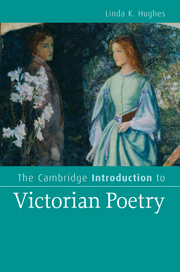Book contents
- Frontmatter
- Contents
- List of figures
- Preface
- Acknowledgments
- Editions cited
- Introducing Victorian poetry
- Part I The forms of Victorian poetry
- Part II The rhetoric of Victorian poetry
- Part III Coda Close readings
- 10 Elizabeth Barrett Browning, Aurora Leigh
- 11 Ernest Dowson, “Vitae summa brevis spem nos vetat incohare longam” and Thomas Hardy, “Friends Beyond”
- Glossary
- Notes
- Further reading
- Index
- Cambridge Introductions to Literature
10 - Elizabeth Barrett Browning, Aurora Leigh
Published online by Cambridge University Press: 05 June 2012
- Frontmatter
- Contents
- List of figures
- Preface
- Acknowledgments
- Editions cited
- Introducing Victorian poetry
- Part I The forms of Victorian poetry
- Part II The rhetoric of Victorian poetry
- Part III Coda Close readings
- 10 Elizabeth Barrett Browning, Aurora Leigh
- 11 Ernest Dowson, “Vitae summa brevis spem nos vetat incohare longam” and Thomas Hardy, “Friends Beyond”
- Glossary
- Notes
- Further reading
- Index
- Cambridge Introductions to Literature
Summary
It is one of the longest poems in the world, and there is not a dead line in it.
A. C. Swinburne[Aurora Leigh is] the greatest poem which the century has produced in any language.
John RuskinEarly in 1845 Elizabeth Barrett Browning began to envision “a sort of novel-poem – a poem as completely modern as ‘Geraldine's Courtship,’ running into the midst of our conventions, & rushing into drawingrooms & the like ‘where angels fear to tread’; – & so, meeting face to face & without mask, the Humanity of the age, & speaking the truth as I conceive of it, out plainly.” By form alone Barrett Browning announces her allegiance to modernity in the resulting poem. Aurora Leigh self-consciously melds poetic and novelistic narrative into an innovative hybrid medium that, like so many Victorian novels, turns on class relations and social reform. Its novel-plot can be readily summarized.
Aurora, born to a well-educated Englishman and blue-eyed Florentine, loses her mother at age four and is raised by her Italian nurse and heartbroken father (who teaches her from his books) until he too dies when she is thirteen. Aurora then travels to England to live with her maiden aunt, who attempts to suppress Aurora's Italian passions and subject her to rigid feminine discipline. Aurora survives thanks to the nurturing presence of nature glimpsed from her window, and above all her discovery of poetry, a scintillation of the universe and revelation of her true vocation.
- Type
- Chapter
- Information
- The Cambridge Introduction to Victorian Poetry , pp. 261 - 275Publisher: Cambridge University PressPrint publication year: 2010



